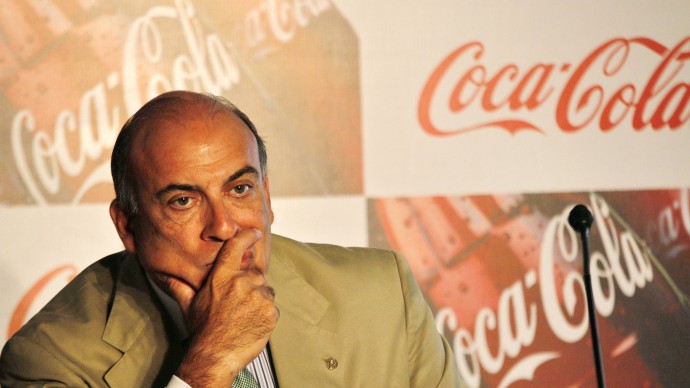
(MintPress) — Employees at the Namibian Beverages bottling company, a unit of the Coca-Cola Company, returned to work last week after a national strike over wages and salary increases threatened to disrupt the supply of soft drinks in the southwest African nation.
Namibian Beverages released a statement in response to the strike, saying, “Service delivery to our customers throughout Namibia will be affected and we apologise to our customers and consumers for the inconvenience caused. Negotiations are ongoing and the parties remain committed to finding an amicable solution soonest.”
The Namibian Food and Allied Workers’ Union (NAFAU) led roughly 380 workers on a strike earlier this month after wage negotiations reached a deadlock. According to Simon Muukapo, branch organizer for NAFAU, the negotiations failed after the company refused to pay a $1,745 Namibian dollar per month increase on basic salaries, raising the total monthly salary for the lowest employees to N$3,500 a month, roughly $413 per month. These employees previously earned N$1,755 a month, close to $207.
Category two employees demanded a 14 percent increase of their basic salaries, which start at N$2,501 a month. Namibian Beverages was only willing to give an 8.5 percent increase for category two employees and an N$275, or $32, per month increase for category one employees.
A long standing Coca Cola employee told the Informanté that the problems stem from new employees earning more than long-serving workers like himself, who has worked with the company for more than twenty years.
“I earn N$5,000 a month, which is very little after 22 years of service,” said Nghifilai, whose real name was withheld upon request. “I want the Coca-Cola company to see everyone the same, black and white, not like under apartheid and I want them to recognise us if we have worked here for long,” he said.
The strike came to an end last week when Namibian Beverages, soon to be called Coca-Cola Namibia Bottling Company, Ltd. effective July 1, came to an agreement with NAFAU, settling on a 12.5 percent increase in basic wages for permanent employees earning N$2,501 or more per month. Permanent workers earning less than N$2,500 per month will receive a salary increase of N$1,000.
The NAFAU branch organiser in the northern town of Oshakati told New Era he hopes the company will hold true to their word. “We hope that the deal is in good faith. Our interest all along has been to get Coke’s attention and let them know we are not going to tolerate it if they will not bargain in good faith. This agreement recognises the importance we attach to the proper remuneration of our members and strikes an appropriate balance,” he said.
Namibian strikers resonate with Coca-Cola strikers in US
Union workers at the Coca-Cola bottling facility in East Hartford, Conn. are also hoping that a deal signed over the weekend to end a six-week strike over compensation and insurance benefits was also made in good faith.
About 350 union members will return to work this week, ending a six-week strike that began after seven months of negotiating failed to resolve issues over medical and dental insurance coverage. Members of Teamsters Local 1035 are upset that Coca-Cola has begun insisting that union members pick up part of the expense of health insurance.
Two weeks into the strike, workers expanded their picketing to include Stop & Shop supermarkets, which carry Coca-Cola products. Teamsters, who work as drivers in soda bottling operations and in the warehouse, are paid between $15 and $20 per hour. Health insurance costs another $7.16 per hour.
David White of Teamsters Brewery & Soft Drink Conference said that while 400 workers went on strike in Connecticut, 1,700 Coca-Cola workers went on strike separately in Los Angeles. White told the Associated Press that workers in Connecticut cannot afford to pay higher health care costs.
“These are folks that live paycheck to paycheck, many of them. They’re not well-to-do people. And you have the company giving out huge consulting contracts and lifetime health care coverage for departing executives and that doesn’t seem to bother them,” said White.
Workers are also concerned about new distribution patterns that could allow stores like Wal-mart to pick up products at the warehouse instead of having drivers deliver product, which could leave many employees out of work.
Coke’s bad history with labor unions
Labor strikes are common among Coca-Cola employees given the company’s long history of human rights abuses, particularly concerning labor unions worldwide. The Coca-Cola Company is most notorious for its alleged involvement in the kidnapping, torture and murder of union leaders and members of their families, especially in Colombia and Guatemala, over the past few decades.
In the 1970s, a series of mysterious murders of union-affiliated employees took place at the Coca-Cola bottling plant in Guatemala. In 2010, a lawsuit was filed against the Coca-Cola Company on behalf of eight Guatemalan plaintiffs claiming the company was involved in the murders.
Coca-Cola’s main bottling company in Latin America, Panamerican Beverages, has been accused of hiring paramilitary mercenaries to assassinate union leaders, resulting in several lawsuits and boycotts against the Coca-Cola Company. The Coca-Cola Company denies the allegations.
The Coca-Cola Company states on its website, “Respecting human rights and protecting workplace rights is fundamental to our culture—and imperative for a sustainable business. In our Company and across our system, we are working to make sure all people are treated with dignity and respect. We take a proactive approach to securing these rights in every workplace of The Coca-Cola Company, in our bottling system, in our supply chain and in the communities in which we operate.”
Despite the company’s commitment to dignity in the workplace, labor issues persist in Coca-Cola facilities. Last year, Coca-Cola workers at the Nigerian Bottling Company Plc protested against the company’s poor working conditions and low wages.
“We do hard labor with sweat, as if we are prisoners and they expect us to survive with ₦400 a day ($2.50),” said Femi Martins, one of the Nigerian workers. “At the end of the year, we don’t even get a bottle of coke as a bonus for the year’s work.”


